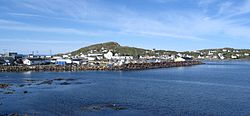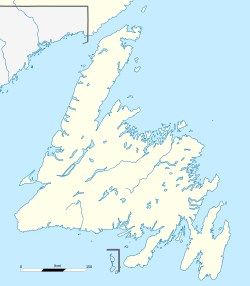Twillingate, Newfoundland and Labrador
|
Twillingate Toulinquet |
|
|---|---|

A view of Twillingate
|
|
| Nickname(s): Iceberg Capital of the World | |
| Location of Twillingate in Newfoundland | |
| Coordinates: 49°38′40″N 54°44′37″W / 49.64444°N 54.74361°W | |
| Country | Canada |
| Province | Newfoundland and Labrador |
| Census division | Division No. 8 |
| Incorporated | September 30, 1965 |
| Government | |
| • Mayor | Gordon Noseworthy |
| • MHA |
Derek Bennett (Twillingate - Lewisporte) |
| • MP |
Scott Simms (Bonavista—Gander—Grand Falls—Windsor) |
| Area | |
| • Land | 25.74 km2 (9.94 sq mi) |
| Population (2011) | |
| • Total | 2,269 |
| • Density | 88.2/km2 (228/sq mi) |
| Time zone | Newfoundland Standard Time Zone (UTC-3:30) |
| • Summer (DST) | Newfoundland Daylight Time (UTC-2:30) |
| Postal Code | A0G 4M0, A0G 1Y0 |
| Area code(s) | 709 |
| Highways | Highway 340 |
| Website | http://www.townoftwillingate.ca |
Twillingate is a town of 2,269 people located on the Twillingate Islands ("Toulinquet") in Notre Dame Bay. It is located off the northeastern shore of the island of Newfoundland in the province of Newfoundland and Labrador, Canada. It was incorporated on September 30, 1965. The town is about 100 kilometres (62 mi) north of Lewisporte and Gander. The Town of Twillingate includes such localities as Back Harbour, Bayview, Durrell, Gillard's Cove, Jenkins Cove, Manuel's Cove, and Wild Cove.
The islands provide an excellent sheltered harbour and easy access to the rich fishing grounds nearby. In recent years, a causeway named after Walter B. Elliot was built, which connects it to the mainland via New World Island. Labeled as "The Iceberg Capital of the World", the town is one of the oldest ports on the island. It was a historic fishing community, but because of the decline of the fishing industry, its economy now relies more on tourism.
The earliest known people to inhabit the area were the Maritime Archaic, who occupied the area about 3,500 years ago in 1500 BC. The Maritime Archaic people were later supplanted by the Beothuk, and possibly the Dorset Inuit, who occupied the area until the arrival of European settlers.
...
Wikipedia

